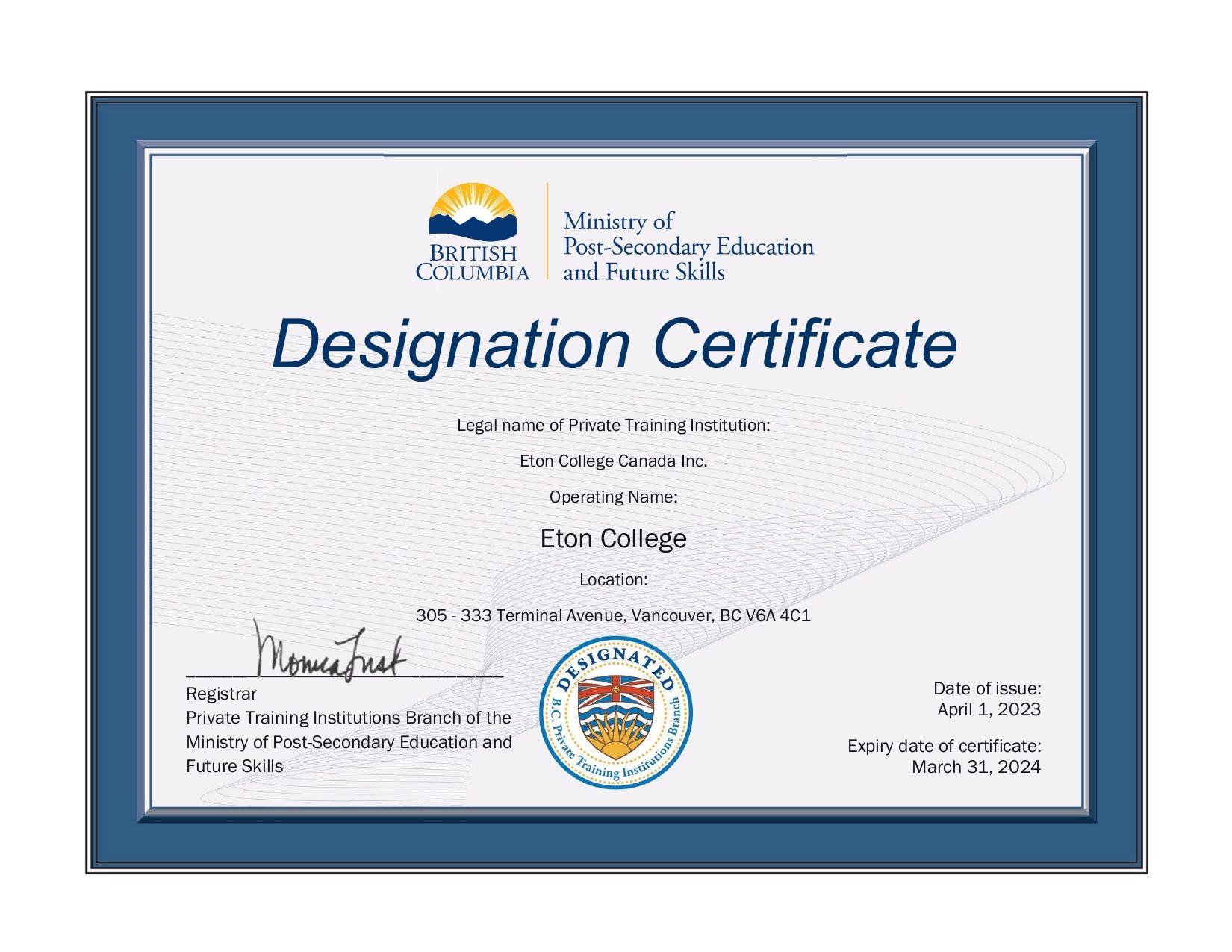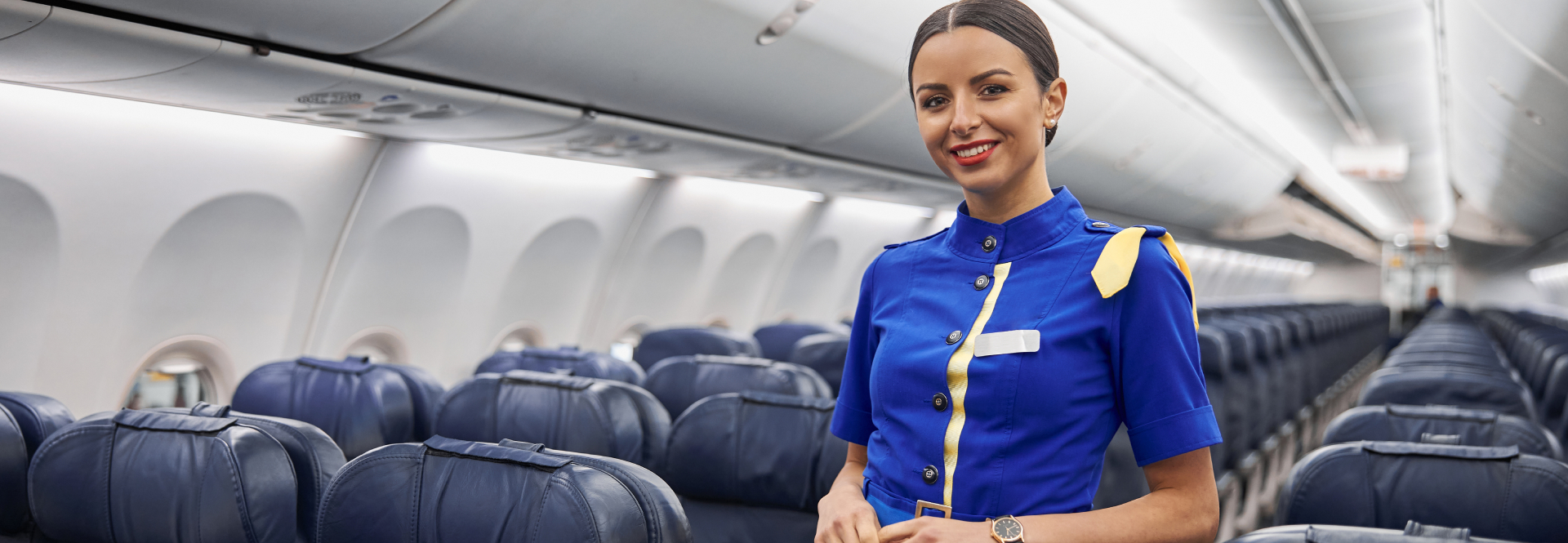- 44 weeks
- / in-class / Hybrid
- Diploma
Program Advantage
- 864-Hour Comprehensive Instructional Training
- Canadian and International Standard-Focused Curriculum
- Mock-flight Exercise
- Blended learning
- Guided Mentorship by Industry Experts
- Wide Network of Airline and TourismIndustry Partners
- 24/7 Support
At Eton College, we pride ourselves on delivering high-standard education in Vancouver, Canada. For more than 20 years, we have been proud to help 83% of our graduates to land their dream careers through our various PTIB-certified and industry-relevant upskilling programs, specializing in Business Management, Travel and Tourism Management, Hospitality Management, Flight Attendant Preparation, Information Technology, and Communication training.
-
Overview
- Career Opportunities
- Curriculum
- Fees
- Intake
- Admission
- Career Services
Course Overview
Students ready to take off! In this highly curated program, students will gain an in-depth understanding about the tourism sector, its operations, sustainability practices, insights and trends, leadership and management, and other business essentials. Student will also learn the fundamentals of aviation, aircraft knowledge, emergency and security protocols, management and operations, and exceptional customer service which aims to inspire graduates to be high functioning global leaders in tourism and aviation.
Key Highlights:
- The program has a thorough coverage on highly important Aviation knowledge including fundamentals, terminologies, safety and emergency procedures, geography and time zones, and other aviation-related operations.
- Develop leadership and management skills essential to the travel and tourism industry.
- Participate in a mock flight exercise and apply the learned safety and service in-flight procedures.
- Gain market advantage through its cross-cultural curriculum (Canadian and International).
- It goes beyond theoretical knowledge by providing practical training and learning, experience in key areas like in-flight services, interview skills, and emergency procedures.
- An intensive 44 week program that allows you to gain the necessary qualifications in a shorter time frame.
Master the Fundamentals of:
- Cross-cultural Tourism
- Destination Marketing
- Ethics & Sustainable Tourism
- Human Resources Management in Tourism
- Introduction to Tourism
- Restaurant & Food Service Operations
- Sport and Recreation Management: Laws & Risks Technology in Travel
- Tourism Geography
- Tourism Office Operations
- Tourism Product & Service Operations
- Transportation Fares & Costing
- Aviation Geography
- Aviation Security
- Customer Service
- Introduction to Aviation
- Professional Development
- Safety and Emergency Procedures

Career Opportunities
Graduates of the Travel and Tourism Management and Flight Attendant Preparation Program of Eton College are equipped with highly-adaptable and future-proof skills set for a wide range of career paths, including:
- Airline Ground Staff/Supervisor
- Bed and Breakfast Owner/Operator
- Campground Operator
- Casino Slot Attendant,
- Customer
- Front Desk Agent
- Gate/Cash Attendant
- General Manager
- Heritage Interpreter
- Recreation/Activity Director (Cruise Ships)
- Reservations Sales Agent
- Retail Supervisor
- Sales Manager
- Small Business Owner/Operator
- Special Events Coordinator
- Ticket Office Supervisor
- Tour Guide
- Tour Operator
- Tourism/Visitor Information Counsellor
- Travel Agency Manager
- Travel Trade Sales Manager
- Travel Writer/Photographer
- Visitor Information Centre Supervisor
Labor Demand
Average Annual Salary of Tourism Management and Flight Attendant Diplomas
- Travel Agent: ($41,000)
- Tourism Manager: ($56,862)
- Flight Attendants: ($52,000)
- Ground Staff: ($40,000)
- Airline Customer Service Agent: ($39,000)
- Regional Chef: ($83,040)
- Casino Managers: ($95,830)
- Accommodation Service Manager: ($69,500)
- Ship Cruise Director: ($63,853)

Curriculum
In-Class | Distance
Duration: 11 Months
Hours: 984 Hrs. including 864 (Instructional) and 120 Hrs. (Co-op)
1. Cross-cultural Tourism
Duration: 48 Hrs.
Prerequisites: None
- Understand different values, attitudes, beliefs, and behaviors of your own self and other cultures.
- Describe and explain consequences of ethnocentrism, prejudice, racism, and stereotyping.
- Learn tourists’ needs and behaviors including communications styles, individualism, power dynamics, and values.
- Design culturally sensitive tourism products and create problem-solving strategies regarding cultural differences and conflicts.
2. Destination Marketing
Duration: 48 Hrs.
Prerequisites: None
- Understand the fundamentals of marketing, structures, and functions, and its application to destination marketing and management organizations or DMO
- Discuss the importance of sales, advertising media, public relations and social media in integrated marketing communications for destination development
- Learn to do market research and create marketing plans for destination brands.
3. Ethics & Sustainable Tourism
Duration: 48 Hrs.
Prerequisites: None
- Expose the learner to a variety of information, website, articles and diverging point of views on sustainable tourism.
- Understand how ethics impacts tourism and how to manage it effectively and responsibly.
- Measure ethical tourism performance and create marketing plans.
4. Human Resources Management in Tourism
Duration: 48 Hrs.
Prerequisites: None
- Gain knowledge on human resource management plan’s components.
- Learn the responsibilities of human resource managers in the tourism industry.
- Analyze how developing work patterns impact HR concerns in the tourism sector.
5. Introduction to Tourism
Duration: 48 Hrs.
Prerequisites: None
- Hospitality Industry Fundamentals
- Analyze different types of restaurants and hotels based on features
- Explore various hotel department functions
- Discover diverse career options
6. Restaurant & Food Service Operations
Duration: 48 Hrs.
Prerequisites: None
- Learn the restaurant and food service business’ basic knowledge, structures, types, operations, and other best practices in food production and sanitation
- Know the restaurant manager’s core responsibilities including menu planning, budgeting, staffing, training, and guest relations.
- Research and choose adequate food service operations technology
7. Sport and Recreation Management: Laws & Risks
Duration: 48 Hrs.
Prerequisites: None
- Learn legal issues in Canadian sport and recreation management including risk analysis, insurance, legal liability, issues in tourism and casual recreation, and professional and amateur sport participation.
- Explain risk management in adventure and high-risk tourism and practice best approaches in different environments.
- Identify the responsibilities of various levels of government in recreation risk management.
8. Technology in Travel
Duration: 48 Hrs.
Prerequisites: Transportation Fares & Costing (Recommended)
- Learn how to operate a Global Distribution System (GDS), also called a Computerized Reservation System (CRS).
- Accomplish two (2) computer-based training module courses from Vocational Instruction and Software, Incorporated (VIASINC) for the SABRE reservations system.
- Learn to create bookings, encode-decode cities and airports, display flight schedules, create Passenger Name Record (PNR) using case studies.
9. Tourism Geography
Duration: 48 Hrs.
Prerequisites: None
- Understand basic geographical concepts of the world
- Identify key major attractions and destinations
- Learn the essentials for traveling
- Familiarize the different systems used globally when traveling
10. Tourism Office Operations
Duration: 48 Hrs.
Prerequisites: None
- Understand the fundamentals of travel agency operations.
- Explain how regulatory reforms, competitive markets, and automation have affected travel agencies.
- Learn airline regulations, aircraft routes, types, airline agreements, and other activities influencing airfares.
11. Tourism Product & Service Operations
Duration: 48 Hrs.
Prerequisites: None
- Get to know various tourism products including surface and ground Transportation (rail, car rental and motor coach companies), accommodation, cruise industry, tour operators, and events.
- Understand the importance of the different modes of surface transportation to the tourism industry and issues related to them.
- Learn how to research suppliers while evaluating costing models (MNEs) in creating itineraries.
12. Transportation Fares & Costing
Duration: 48 Hrs.
Prerequisites: None
- Gain overview of domestic, trans-border, and international air tariff structures, applicable taxes, currency, and ticketing processes.
- Learn to interpret and apply domestic fare and rule displays
- Understand international fare systems and elements of mileage systems.
13. Introduction to Aviation
Duration: 48 Hrs.
Prerequisites: None
- Master Aviation Essentials
- Develop customer service techniques
- Practice fundamental safety procedures
14. Aviation Geography
Duration: 48 Hrs.
Prerequisites: None
- Comprehend and apply Aviation Geography
- Understand concepts of 24-hour clock and flight operations
15. Aviation Security
Duration: 48 Hrs.
Prerequisites: None
- Sharpen Security Skills
- Develop heightened awareness
- Emphasis on Safety and Security
16. Customer Service
Duration: 48 Hrs.
Prerequisites: None
- Master Customer Care
- Learn in-flight skills as a service provider
- Acquire effective problem solving techniques
17. Professional Development
Duration: 48 Hrs.
Prerequisites: None
- Understand the Flight Attendant Career Path
- Master Communication
- Navigate the Hiring Process
- Acquire Interview Skills
- Develop Your Career Roadmap
18. Safety and Emergency Procedures
Duration: 48 Hrs.
Prerequisites: None
- Master Aircraft Safety
- Explain the use of aircraft safety and emergency equipment
- Practice safety procedures
- Crew Readiness
19. Practicum
Duration: 120 Hrs.

Total Program Fee
Fees:
| Details | Domestic Students | International Students |
|---|---|---|
| Tuition | CAD 12,950 | CAD 17,400 |
| Application Fee | CAD 150 | CAD 150 |
| Text Books | CAD 1,150 | CAD 1,150 |
| Course Materials | CAD 100 | CAD 100 |
| Other | CAD 585 | CAD 585 |
Admin Fees (only if applicable):
Course retake: CAD 850 per course
Copy of Transcript: CAD 20 per copy
Applications are open. Secure your spot now!

Intake Dates
May 13, 2024 | May 27, 2024 | June 10, 2024 | June 24, 2024 | July 8, 2024 | July 29, 2024 | August 12, 2024 | August 26, 2024 | September 9, 2024| September 23, 2024 | October 7, 2024 | October 21, 2024 | November 4, 2024 | November 18, 2024 | December 2, 2024 | December 16, 2024 | January 13, 2025 | January 27, 2025 | February 10, 2025 | February 24, 2025 | March 10, 2025 | March 31, 2025 | April 14, 2025

ADMISSION REQUIREMENTS:
- Applicants must provide a valid photo ID or birth certificate
- Applicants must hold a high school diploma or be at least 19 years of age
- Students under the age of 19 require their parent or guardian’s signature
- Student must complete an intake with Admissions team Member
Mandatory criteria for all applicants:
- Medical insurance coverage and
- Flight attendant preparation entrance agreement, when applicable, and
- Received approval from the Registrar
- Meet one of the English Proficiency requirements
English proficiency requirements
Applicants must provide one of the following:
- BC high school English 12 ‐ minimum C (60‐66%) (or equivalent in another school system) or;
- TOEFL PBT score 500, or CBT 173, or iBT 61 or;
- IELTS ‐ minimum overall band test score 6 or;
- CLB (Canadian Language Benchmark) 7 or:
- Successfully complete the Eton College Placement Test or;
- Successfully complete the Eton College Business Environment Communications Program
Minimum Technology Requirement:
| Component | Specification |
| Processor | Intel Core i5 or AMD Ryzen 5 (or better) |
| RAM | At least 8 GB |
| Storage | Minimum 256 GB (SSD recommended) |
| Internet | High-speed connection |
| Peripherals | Webcam, Microphone, Headphones/Earbuds |
| Operating System | Windows 10 or newer, macOS 10.14 or newer |
| Software | Web browser (Chrome, Firefox, Safari, or Edge), Video conferencing tools (e.g., Zoom, Microsoft Teams) |

Career Services
Success beyond the classrooms at Eton College!
Land your dream job through our career services:
- Practicum and Coop Partnerships
Apply your learning and work alongside industry leaders in a professional setting with our strong network of leading companies through Wayble.
- Career Seminars and Workshops
Get career-ready through our insightful workshops and seminars with industry experts to master the skills you need to land your dream job.
- 1:1 Professional Resume and Portfolio Building
Market yourself like a pro by developing and refining stellar resumes, portfolio, and online profiles with a dedicated career advisor.
- Mock Interviews & Coaching
Experience interactive mock interviews and coaching sessions, led by our career advisors, to build confidence and hone interview skills.
- Skillset Discovery
Let our expert career advisors help you identify your key strengths and skills tailored to your personal brand and desired careers.
Jump on board. Enroll Now!

We are PTIB-Certified!
What does that mean for Eton students?
- Our rigorously designed programs meet high standards
- Our students’ education investments are secured with strict and clear student policies and support systems.
- Quality education you can trust that undergoes regular audits
- PTIB-certified diplomas are respected by employers across various industries.

Our Alumni Network
- Gulf of Georgia Cannery National Historic Site
- Holiday Inn Express
- Wedgewood Hotel & Spa
- Best Western King George Inn & Suites
- Rainbow Travel Inc
- H.I.S travel agency
- Vancouver International Travel Expo
- Element Hotels
- Sandman Hotels Group
- Rocky Mountaineer
- McDonald's
- Delta Hotels by Marriott
- Vancouver Aquarium

